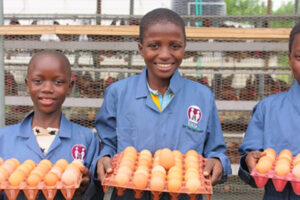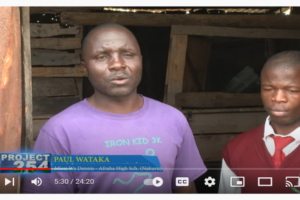
DR Congo President, Tshisekedi, shows interest in STEP, sends Special Envoy
- Posted by steppad
- Categories Blog, STEP in Nigeria
- Date January 30, 2022
Having initiated a partnership with the International Institute of Tropical Agriculture (IITA) and the African Development Bank (AfDB) to transform agriculture in Democratic Republic of Congo (DRC), President of the Felix Tshisekedi sent a delegation to study the economics and business case of the IITA Start Them Early Program (STEP).
The special envoy from H.E. Felix Tshisekedi, the President DRC President, Mr Pacifique Kahasha Birindwa, accompanied by Mr Felix Karume Ntwali, visited Fasola Grammar School in January 2022, as part of their tour of IITA’s technologies and ongoing programs.
The delegates were accompanied by Dr Adebowale Akande (D.G. OYSADA, Senior Specialist & Head of Agribusiness and Mechanisation/Youth, Oyo State Agribusiness Development Agency), the STEP team and members of the IITA Youth Agripreneurs Unit. The STEP Assistant Coordinator, Ms Bolanle Larinde, Principal Officers, and teachers at Fasola Grammar School, students, and other team members received the delegates at the STEP Agribusiness Facility in Fasola Grammar School.
The STEP team explained how the program and the STEP-Oyo partnership was impacting on the students, schools, and community. The delegates toured the Processing Centre, ICT room, Training room, Broilers and Layers pen, the Screen house, School Hall, Classrooms, Offices, and Central Science Laboratory. They observed the modern agricultural equipment, small-scale farm machines, and the ICT and internet facilities.
STEP students put up agribusiness demonstrations in addition to the exhibition of branded products, confectionery, vegetables, eggs, broiler birds, graphic designs, slide presentation, sanitisers, and liquid soaps.
Mr Pacifique Kahasha Birindwa commended the STEP team, the teachers, and partners for the project’s remarkable impact on the students, communities, and agricultural development. “We want DG Sanginga to replicate these programs not only in DRC but also in other countries of Africa,”he said. “We want to train people who will train others so that we can take control of our economy.”
You may also like

STEP Kenya Participates at the Nakuru National Agricultural Show

STEP beneficiaries run viable agribusiness ventures in the communities

